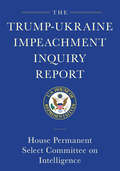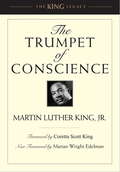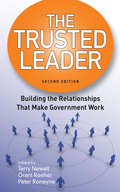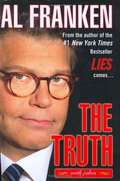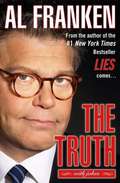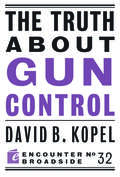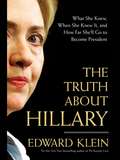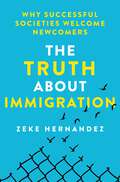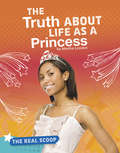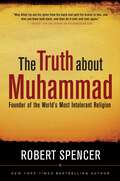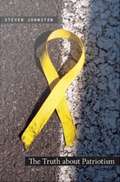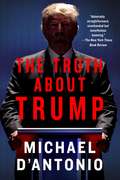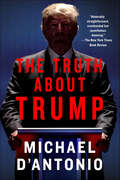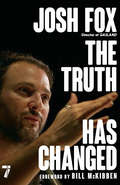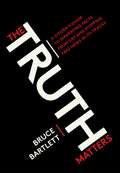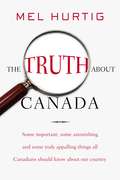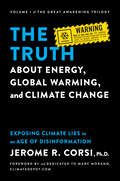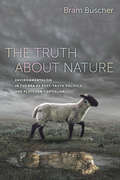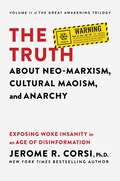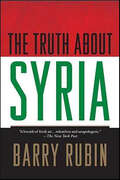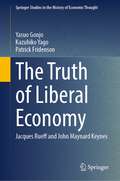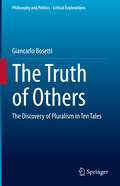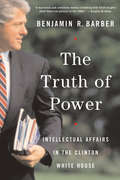- Table View
- List View
The Trump-Ukraine Impeachment Inquiry Report and Report of Evidence in the Democrats' Impeachment Inquiry in the House of Representatives
by House Permanent Select CommitteeThis book includes BOTH the official report of the impeachment investigation by the House Intelligence Committee AND the document issued in response by House Republicans.A guidebook to the impeachment of President Trump, this two-in-one book contains BOTH the official report of the impeachment investigation by the House Intelligence Committee led by Adam Schiff AND the document issued in response issued by House Republicans led by Devin Nunes. And the package tells half the story: The book is published as a "flip" book -- that is, with each cover acting as a front cover, one for the Committee report, and one for the Republican report. Depending on which one you read first, you then flip the book over to read the other.
The Trumpet of Conscience
by Martin Luther KingIn November and December 1967, Dr. Martin Luther King, Jr., delivered five lectures for the renowned Massey Lecture Series of the Canadian Broadcasting Corporation. The collection was immediately released as a book under the title Conscience for Change, but after King's assassination in 1968, it was republished as The Trumpet of Conscience. The collection sums up his lasting creed and is his final testament on racism, poverty, and war. Each oration in this volume encompasses a distinct theme and speaks prophetically to today's perils, addressing issues of equality, conscience and war, the mobilization of young people, and nonviolence. Collectively, they reveal some of King's most introspective reflections and final impressions of the movement while illustrating how he never lost sight of our shared goals for justice. The book concludes with "A Christmas Sermon on Peace"--a powerful lecture that was broadcast live from Ebenezer Baptist Church on Christmas Eve in 1967. In it King articulates his long-term vision of nonviolence as a path to world peace.
The Trusted Leader: Building the Relationships that Make Government Work
by Grant Reeher Terry N. Newell Peter RonayneImproving government on a macro level is only possible with public managers who herald change on a micro level. While many studies of government reform focus on new policies and programs, these public managers—building relationships built on trust—are the real drivers behind many successful reforms.In this second edition, chapter authors once again draw on their real-world experience to demonstrate the importance of values-based leadership. With new research and lessons from the first two years of the Obama administration, chapters focus on the concrete ways in which leaders build effective relationships and trust, while also improving themselves, their organizations, and those they coach. Surveying agencies both horizontally and vertically, The Trusted Leader also addresses how public managers can collaborate with political appointees and the legislative branch, while still engaging with citizens to create quality customer experiences.Two brand-new chapters focus on:“Effective Conversations”—the importance of one-on-one conversations to building trust, with a model for having such conversations.“The Diversity Opportunity”—the need to effectively lead across a diverse workforce and a diverse society to build trust in both realms. With the addition of chapter headnotes, the editors provide necessary context, while the new “Resources for Further Learning” feature guides readers toward additional print and web resources.
The Truth (with jokes)
by Al FrankenFranken on Iraq, gay marriage, Bill Frist diagnosing Terri Schiavo, Bush's 9/11 Bait and Switch, moral values, the Social Security crisis and more
The Truth (with jokes)
by Al FrankenA New York Times BestsellerAl Franken's new book picks up where Lies and "The Al Franken Show" leave off. Armed with an arsenal of facts and research (and comedy!), Al is ready to take the fight to the Bush administration and its right-wing cronies. Intelligent, insightful, inspiring, and laugh-out-loud funny, Al's hard-hitting work of political satire is poised to become the most talked-about book of the year.
The Truth About Gun Control
by David B KopelWho is sovereign in the United States? Is it the people themselves, or is it an elite determined to rule citizens who are seen as incapable of making choices about their own lives? This is the central question in the American gun-control debate.In this Broadside, David Kopel explains why the right to keep and bear arms has always been central to the American identity - and why Americans have always resisted gun control. The American Revolution was sparked by British attempts to confiscate guns. After the Civil War, the U.S. changed the Constitution to defeat the nation's first gun-control organization, the Ku Klux Klan. When Hitler and Stalin demonstrated how gun registration paves the way for gun confiscation, which paves the way for genocide, Americans resolved to make sure it never happens here.Gun control is not an issue of left vs. right or urban vs. rural. The right to bear arms is crucial to prevent large-scale tyranny by criminal governments and small-scale tyranny by ordinary criminals - and to protect our Constitution.
The Truth About Hillary
by Edward KleinHillary Rodham Clinton is the most polarizing figure in American politics. Love her or hate her, everyone has a strong opinion about the former first lady turned senator who is almost certainly going to run for president in 2008. Despite more than a dozen years in the national spotlight and more than a dozen unauthorized books about her, she has managed to keep many secrets from the public especially about her turbulent marriage and its impact on her career. There have been plenty of rumors about what Hillary and Bill Clinton did behind closed doors, but never a definitive book that exposes the truth. Bestselling author Edward Klein draws on rare access to inside sources to reveal what Hillary knew and when she knew it during her years as first lady, especially during her husband’s impeachment. Klein’s book, embargoed until publication, will break news about the choices and calculations she has made over the years. It will also prove that she lied to America in her bestselling autobiography Living History. When she was just a little girl, Hillary Rodham dreamed of becoming the first female president, and her lifelong dream is almost within reach. But just as the swift boat veterans convinced millions of voters that John Kerry lacked the character to be president, Klein’s book will influence everyone who is sizing up the character of Hillary Clinton. .
The Truth About Immigration: Why Successful Societies Welcome Newcomers
by Zeke HernandezThe go-to book on immigration: fact-based, comprehensive, and nonpartisan.Immigration is one of the most controversial topics in the United States and everywhere else. Pundits, politicians, and the public usually depict immigrants as either villains or victims. The villain narrative is that immigrants pose a threat—to our economy because they steal our jobs; our way of life because they change our culture; and to our safety and laws because of their criminality. The victim argument tells us that immigrants are needy outsiders—the poor, huddled masses whom we must help at our own cost if necessary. But the data clearly debunks both narratives. From jobs, investment, and innovation to cultural vitality and national security, more immigration has an overwhelmingly positive impact on everything that makes a society successful.In The Truth About Immigration, Wharton professor Zeke Hernandez draws from nearly 20 years of research to answer all the big questions about immigration. He combines moving personal stories with rigorous research to offer an accessible, apolitical, and evidence-based look at how newcomers affect our local communities and our nation. You'll learn about the overlooked impact of immigrants on investment and job creation; realize how much we take for granted the novel technologies, products, and businesses newcomers create; get the facts straight about perennial concerns like jobs, crime, and undocumented immigrants; and gain new perspectives on misunderstood issues such as the border, taxes, and assimilation.Most books making a case for immigration tell you that immigration is good for immigrants. This book is all about how newcomers benefit you, your community, and your country. Skeptics fear that newcomers compete economically with locals because of their similarities and fail to socially assimilate because of their differences. You'll see that it's exactly the opposite: newcomers bring enduring economic benefits because of their differences and contribute positively to society because of their similarities. Destined to become the go-to book on one of the most important issues of our time, this book turns fear into hope by proving a simple truth: immigrants are essential for economically prosperous and socially vibrant nations.
The Truth About Life as a Princess (The Real Scoop)
by Martha LondonHow does someone become a princess? What do princesses do? Learn about how princesses work for their countries, give back to charity, and more!
The Truth About Muhammad: Founder Of The World's Most Intolerant Religion
by Robert SpencerMuhammad: a frank look at his influential (and violent) life and teachingsIn The Truth about Muhammad, New York Times bestselling author and Islam expert Robert Spencer offers an honest and telling portrait of the founder of Islam-perhaps the first such portrait in half a century-unbounded by fear and political correctness, unflinching, and willing to face the hard facts about Muhammad's life that continue to affect our world today.From Muhammad's first "revelation" from Allah (which filled him with terror that he was demonpossessed) to his deathbed (from which he called down curses upon Jews and Christians), it's all here-told with extensive documentation from the sources that Muslims themselves consider most reliable about Muhammad.Spencer details Muhammad's development from a preacher of hellfire and damnation into a political and military leader who expanded his rule by force of arms, promising his warriors luridly physical delights in Paradise if they were killed in his cause. He explains how the Qur'an's teaching on warfare against unbelievers developed-with constant war to establish the hegemony of Islamic law as the last stage.Spencer also gives the truth about Muhammad's convenient "revelations" justifying his own licentiousness; his joy in the brutal murders of his enemies; and above all, his clear marching orders to his followers to convert non-Muslims to Islam-or force them to live as inferiors under Islamic rule.In The Truth about Muhammad, you'll learn- The truth about Muhammad's multiple marriages (including one to a nine-year-old) - How Muhammad set legal standards that make it virtually impossible to prove rape in Islamic countries - How Muhammad's example justifies jihad and terrorism - The real "Satanic verses" incident (not the Salman Rushdie version) that remains a scandal to Muslims - How Muhammad's faulty knowledge of Judaism and Christianity has influenced Islamic theology--and colored Muslim relations with Jews and Christians to this day.Recognizing the true nature of Islam, Spencer argues, is essential for judging the prospects for largescale Islamic reform, the effective prosecution of the War on Terror, the democracy project in Afghanistan and Iraq, and immigration and border control to protect the United States from terrorism.All of which makes it crucial for every citizen (and policymaker) who loves freedom to read and ponder The Truth about Muhammad
The Truth About Obamacare
by Sally C. PipesIn her new book, The Truth About Obamacare, Sally C. Pipes-president of the Pacific Research Institute and an acknowledged expert on health care reform-reveals what Democrats in Congress and President Obama don't want you to know: Obamacare is even worse than most critics suspect. Debunking the myths that the current administration has touted, Pipes shows exactly what the new health care law will mean for you, your family, your doctor, and your wallet. She also reveals how, contrary to its promises, Obamacare will make health care more expensive, limit your options, lead to deteriorating medical care, and weaken America's already frail economy.
The Truth About Patriotism
by Steven JohnstonThe Truth about Patriotism is a bracing repudiation of the claim that patriotism is essential--or even beneficial--to democracy. Contending that even at its best patriotism subverts the democracy it purports to value, Steven Johnston turns to patriotism's defenders to show how they must jettison much of democracy to champion patriotism. Closely examined, patriotism itself effectively demonstrates the impossibility of love of country. Patriotism, Johnston argues, tends toward narcissistic self-regard, blind to its violent ways of being in the world and its dependence on death. Thus we would be better off without it. Drawing largely from aspects of American political and popular culture, this wide-ranging book presents a wealth of examples to disclose patriotism's self-defeating character. They include Richard Rorty's and John Schaar's enmity-driven love of country, Socrates's angry judicial suicide, the violent obsessions of High Noon and Saving Private Ryan, the triumphalist self-display of the World War II Memorial, Oliver Stone's and Don DeLillo's spectacular representations of the assassination of President Kennedy, George W. Bush's symbolic sacrifice of more Americans in commemoration of September 2001, and yet other memorials to and apologies for patriotism. Ultimately, Johnston calls for a vision of democracy that uses the tragic possibilities inherent in politics as a spur to a life-affirming civic ethos of reciprocal generosity.
The Truth About Trump
by Michael D'AntonioFor all those who wonder, "Just who is Donald Trump?", The Truth About Trump supplies the answer. Drawing upon exclusive interviews and exhaustive research, Pulitzer Prize-winning reporter Michael D'Antonio presents Trump's full story, from his beginnings as a businessman to his juggernaut presidential campaign. Along the way, D'Antonio charts the successes and failures, scandals and triumphs, and relentless pursuit of money and fame that have made Trump who he is today. D'Antonio also details the origins of the Trump family fortune, Trump's history of using politics to get ahead, and how he has mastered the media to turn publicity into power. First published in 2015, and now updated to cover Trump's rise to political prominence, The Truth About Trump is an unsparing, eye-opening account of the life and career of the most talked-about man in America. “A carefully reported and fair-minded account.”―USA Today “A brisk and entertaining read, drawing on interviews and documents and distilling decades' worth of news coverage to tell the story of Trump's childhood, family, business deals, and political forays.” ―The Washington Post "Balanced, well sourced, and perfectly timed."―Financial Times (UK)
The Truth About Trump
by Michael D'AntonioWho is the man shaking up the GOP?What does he really stand for?How far will he go in his pursuit of power?This isTHE TRUTH ABOUT TRUMPHe is one of the world’s most successful businessmen—and a man who many Americans love to hate. So how did Donald Trump become a serious contender in the race for the country’s highest office? His critics think his run for president is a marketing campaign for the Trump brand. His supporters believe that he can make America great again. The only thing both sides can agree on is that Trump is a man whose appetite for wealth, attention, power, and conquest is insatiable. In this up-close-and-personal biography, author Michael D’Antonio draws upon extensive and exclusive interviews with Trump himself to present the full story behind this American icon—from his early life to the headlines of today. “Carefully reported and fair-minded.”—USA Today “A brisk and entertaining read.” —The Washington PostPreviously published in hardcover as Never Enough.
The Truth About the IRS Scandals
by Charles C. JohnsonThe IRS scandal is far more complicated than it appears-and more pernicious. Its roots go back to its founding but modern technology has accelerated the harm that a few malicious IRS administrators can do to their political enemies.Lois Lerner, the woman at the center of the congressional probe into the targeting of conservative groups, called the Tea Party "very dangerous" and hoped it could be used to roll back a pro-free speech court case, Citizens United v. Federal Election Commission (2010). Lerner conspired with her old colleagues at the FEC to leak confidential tax information. She even acted to retroactively award tax exempt status to politically connected charities while targeting for destruction those committed to truth.Leaking sensitive information about individuals and organizations is par for the course for committed ideologues in the Obama Administration who rely on an apparatus of far left think tanks and their allies in the press to spin narratives that keep the Washington elite in control. The far left's friends in Congress and the IRS, meanwhile, are doing everything they can to make sure the truth is never brought to light by spinning about what really happened.This Broadside will expose the tax collector conspiracy that kneecapped the Tea Party, one of the greatest citizen uprisings in American history, and educates citizens about what has been done so that they might prevent it from ever happening again. Knowledge, particularly of the arcane regulations of the tax code, is power; a lawless tax collector class can only be curtailed by an active citizenry.The Truth About the IRS Scandals is necessary because only the truth will set Americans free.
The Truth Has Changed
by Josh FoxThe Emmy Award–winning creator of GASLAND tells his intimate and damning, personal story of our world in crisis. With a foreword by Bill McKibben. The rules have changed. The water has changed. The climate has changed. The truth has changed. We must change. In The Truth Has Changed, Josh Fox turns the rapid-fire shocks that are remaking the very fabric of our lives—writing as a first responder, a reporter, a documentarian, and an activist—into art, literature, and at least one answer to the question of what the future holds. Our normal isn’t normal anymore. The paradigm shift that global warming represents parallels a paradigm shift in how we process truth. Both deeply affect democracy. Josh Fox has had a front row seat—a first responder after 9/11, filming the Deepwater Horizon spill close up from the air and on the ground, a member of Bernie Sanders’s delegation of the Democratic Platform Committee, risking his life to cross a bridge on Thanksgiving Day at Standing Rock, traveling the nation and the world, shooting his films, talking to people everywhere he goes. The Truth Has Changed is his first book, the companion to his new one-man show of the same title, and it’s beautiful.
The Truth Matters: A Citizen's Guide to Separating Facts from Lies and Stopping Fake News in Its Tracks
by Bruce BartlettDistinguish fake news from reliable journalism with this clear and concise handbook by New York Times best-selling author Bruce Bartlett.Today’s media and political landscapes are littered with untrustworthy sources and the dangerous concept of “fake news.” This accessible guide helps you fight this deeply troubling trend and ensure that truth is not a permanent casualty. Written by Capitol Hill veteran and author Bruce Bartlett, The Truth Matters presents actionable tips and tricks for reading critically, judging sources, using fact-checking sites, avoiding confirmation bias, identifying trustworthy experts, and more.
The Truth about Canada: "Some Important, Some Astonishing, and Some Truly Appalling Things All Canadians Should Know About Our Country"
by Mel HurtigRenowned as a passionate Canadian, bestselling author Mel Hurtig has combed through world statistics to see how Canada really measures up -- and the results are astonishing, and often shocking.This book is about how Canada has changed, very much for the worse, in the last twenty years. As a result of these profound (often hidden) changes, we are no longer the people we think we are. To take one example, the Canadian media usually leaves us with the impression that Canadians are really heavily taxed. Yes, compared to the U.S.A., the usual point of comparison. No, compared to other countries with our standard of living, other OECD countries, for example; there we come in 23rd on the high-tax scale.The shocks in this book build up, chapter by chapter. How do we rank in the world in voter turnout? Try 109th. Number of physicians per 100,000 population? Try 54th. Our rank in reducing pollution? 126th out of 146 countries.Some of the statistics are internal, comparing Canada then and now. They back up two of the book's most powerful themes: the failure of Canadian big business to turn record profits into ongoing investment in our country, and (no coincidence) the sellout of our assets at a rate that no other country would allow.This statistics-based book ranges across all areas of our lives -- including health, wages, productivity, culture, the media ("the most concentrated in the world"), and much else. Mel Hurtig's message is that we can't do anything to fix the direction we're drifting in unless we recognize it -- and recognize The Truth About Canada.From the Hardcover edition.
The Truth about Energy, Global Warming, and Climate Change: Exposing Climate Lies in an Age of Disinformation
by Jerome R. CorsiThis book exposes the truth that the climate change hoax is a political movement aimed at eliminating capitalism by spreading alarming disinformation that in order to &“save the Earth&” from global warming, we must reduce carbon dioxide emissions by switching from hydrocarbon fuels to renewable energies.The Truth about Energy, Global Warming, and Climate Change: Exposing Climate Lies in an Age of Disinformation reveals a science-based understanding of Earth&’s climate and temperature that Green New Deal proponents are trying to hide. In the pages of this book, you will see scientifically documented evidence for many facts that the radical left denies. Want to know the truth about how energy, temperature, and climate work? Read The Truth about Energy, Global Warming, and Climate Change—but prepare to be shocked. Jerome R. Corsi has conducted a tour-de-force examination of peer-reviewed climate science that exposes the neo-Marxists behind today&’s anti-capitalist global warming hoax.
The Truth about Nature: Environmentalism in the Era of Post-truth Politics and Platform Capitalism
by Bram BüscherHow should we share the truth about the environmental crisis? At a moment when even the most basic facts about ecology and the climate face contestation and contempt, environmental advocates are at an impasse. Many have turned to social media and digital technologies to shift the tide. But what if their strategy is not only flawed, but dangerous?The Truth about Nature follows environmental actors as they turn to the internet to save nature. It documents how conservation efforts are transformed through the political economy of platforms and the algorithmic feeds that have been instrumental to the rise of post-truth politics. Developing a novel account of post-truth as an expression of power under platform capitalism, Bram Büscher shows how environmental actors attempt to mediate between structural forms of platform power and the contingent histories and contexts of particular environmental issues. Bringing efforts at wildlife protection in Southern Africa into dialogue with a sweeping analysis of truth and power in the twenty-first century, Büscher makes the case for a new environmental politics that radically reignites the art of speaking truth to power.
The Truth about Neo-Marxism, Cultural Maoism, and Anarchy: Exposing Woke Insanity in an Age of Disinformation
by Jerome R. CorsiThis book exposes the dark, evil ideology that has descended over America. The arch of the Hegelian dialectic culminates only in negation, with millions annihilated in the nightmare apocalypse of post-modernist Democratic Socialism.The Truth about Neo-Marxism, Cultural Maoism, and Anarchy: Exposing Woke Insanity in an Age of Disinformation reveals how Communist ideology has evolved into its present-day woke madness that began with Immanuel Kant and Georg Wilhelm Friedrich Hegel, continued through Antonio Gramsci and the Frankfurt School, and concluded with post-modern thinkers like Jean Baudrillard. Want to understand why the neo-Marxists, cultural Maoists, and anarchists of the woke critical theory radical Left live in a fundamentally different view of reality, operating with a set of values that redefines truth to be subjective? Read The Truth about Neo-Marxism, Cultural Maoism, and Anarchy—but be prepared to be shocked. Jerome R. Corsi has conducted a tour-de-force examination of philosophical texts, modern critical theory treatises, and the murderous history of Communism under Stalin and Mao that exposes the neo-Marxists behind today&’s anti-capitalist woke schizophrenia.
The Truth about Syria
by Barry RubinSyria has long presented a serious problem for the Middle East region and U.S. policy. With its mix of competing religious and ethnic groups, radical ideologies, and political repression, it is a 72,000-square-mile time bomb waiting to go off. Yet surprisingly, very little is known about this country and the role it has played in shaping the destiny of the Middle East. In The Truth about Syria, Middle East expert Barry Rubin looks at the critical issues that have made the country the powderkeg of the Middle East and offers an insightful analysis of the effects of recent developments.
The Truth of Liberal Economy: Jacques Rueff and John Maynard Keynes (Springer Studies in the History of Economic Thought)
by Kazuhiko Yago Patrick Fridenson Yasuo GonjoThis book provides historical, theoretical, and biographical perspectives on two giants of contemporary economics, Jacques Rueff (1896-1978) and John Maynard Keynes (1883-1946). The former French bureaucrat and academician championed classical economics; the latter British economist founded macro-economics criticizing the classical school. Depending upon archival sources, including personal correspondences between the above two figures, the book describes furious debates between them and surrounding them.In fact, the two economists proposed contrasting diagnosis over almost every event in contemporary world economy: the reparations problem, the Great Depression, the gold exchange standard, and the Bretton Wood System. Keynes appraised managed currency to cope with unemployment, criticizing the classical gold standard; Rueff believed the function of market mechanism, blaming the state intervention. The book highlights deep influence of Rueff, rather larger than Keynes, in Europe before and after WWII.The perspective of the book reaches today’s economic issues. The classical view of Rueff was shared in Mont Pelerin Society, a cradle of neo-liberalism. Rueff’s market-friendly view paved way to the neo-liberal reforms which took place after the 1980s. The classical market theory of Rueff, together with dialogues with the labor unions, prepared the social background of the European Union. This book thus reveals the truth of liberal economy, from the 20th to 21st centuries.
The Truth of Others: The Discovery of Pluralism in Ten Tales (Philosophy and Politics - Critical Explorations #25)
by Giancarlo BosettiThis book offers an account of ten crucial moments in the history of ideas, which represent ten key moments of the discovery of pluralism. From the Indian emperor Ashoka to Origen and from Nicola Cusano to Las Casas, Montaigne, Lessing, giants who opened the way to the thought of tolerance, challenging the dogma of a unique truth dictated by authority, followed in this reconstruction by other glowing thinkers of the twentieth century, such as Horace Kallen, Margaret Mead, and Jacques Dupuis. These protagonists, each in their own way, battled against monism for the respect of differences and for the knowledge of otherness. This kind of hall of fame of pluralist thinkers ends with the most important figure of the pluralism of values, Isaiah Berlin, of whom an unpublished interview appears here for the first time in English. The volume is unique in this two-thousand-year-old variety of voices gathered under the denominator of cultural pluralism that they embody in the deepest and most challenging sense, often at the limits and beyond the limits of heresy. It is of great value and interest to scholars and students of theoretical, moral, political philosophy, sociology, comparative studies, comparative literature, religious diversity, religious studies, anthropology, and all those interested in the history of tolerance.
The Truth of Power: Intellectual Affairs in the Clinton White House
by Benjamin R. BarberIdeas and the presidency flirt with each other, but can they really get along? President Clinton had a romance with big ideas. He intently cultivated intellectuals, seducing them with his characteristic charm and with the promise of real influence on the political stage. Yet most often he disappointed the big thinkers whose advice he sought. Benjamin Barber was first invited to Camp David in 1994, along with other prominent members of the academic community, to participate in a "seminar" with President Clinton on the future of Democratic ideas and ideals. Afterwards, he became a steady informal adviser to the White House. For a politically committed professor like Barber, the opportunity was exhilarating--here was an opportunity to put ideas into action, to link ideas to power. The result was enlightening, if unexpected. The most unpredictable factor was the president himself: a man of astonishing intellectual gifts, a consummate listener and synthesizer of ideas, who nonetheless failed to present a stirring progressive vision or even to craft a memorable speech. With great perceptiveness, wit, and élan, Barber provides a startling meditation on truth and power--and the truth of power, which is the responsibility of the elected not to an idea but to the electorate. He identifies the fault lines that future progressive candidates must straddle if they are to win--and the gift they must have, if they are to be great, of calling forth the best in their fellow citizens. In the end, Barber give us a unique portrait of our compelling and maddening ex-president, and the hopes and disillusionments he represents.
